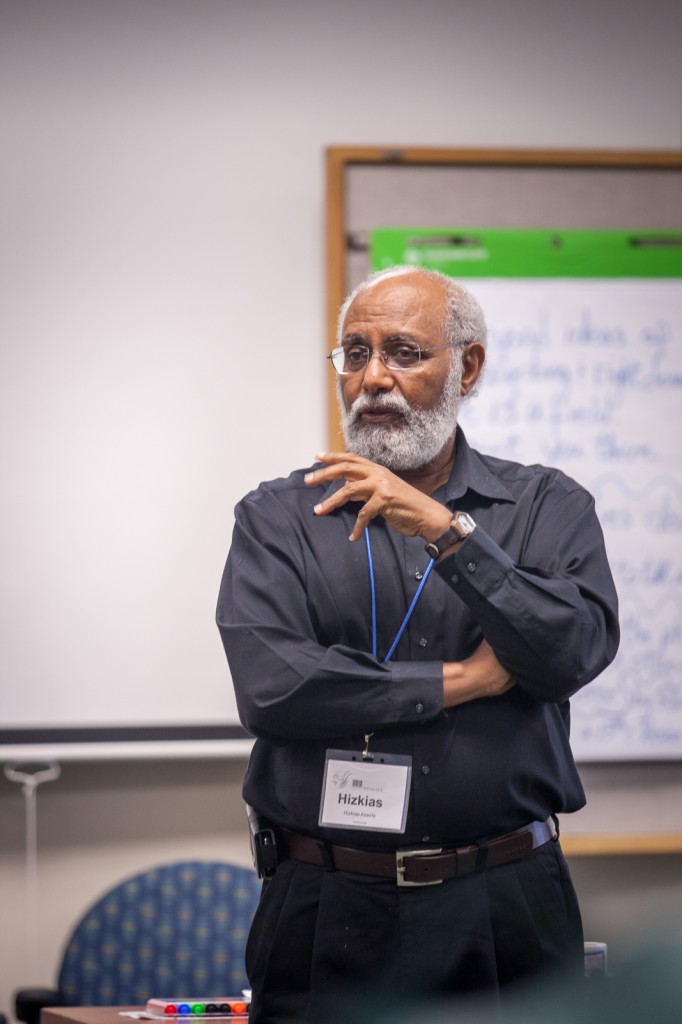Though it’s only March, Bill Goldberg is already looking forward to the 2022 Summer Peacebuilding Institute this May and June with anticipation.
After two years of online programming, SPI returns to the in-person format. That means the EMU campus will once again be a nexus of global peacebuilders; traditionally, the four-session programming draws approximately 200 people from around 30-40 countries. They take courses on a range of peacebuilding topics but it’s the informal spaces outside of class – chatting at the daily coffee break or sharing a meal or a walk up The Hill together – that often mean the most to participants.
“We’ve been more successful than I ever could have hoped for in the last two years of shifting to online programming,” Goldberg said. “We found we could attract a lot of people who couldn’t otherwise come in person. Online was the only way they could take courses, and we plan to continue a series of online courses. But our goal was always to be back in person because there is just so much to the SPI extracurricular experience that you cannot easily recreate online.”
The second reason for Goldberg’s anticipation is a bit more bittersweet: He says this one will be his last. Goldberg has worked with SPI for more than 20 years and been the institute’s director for the last nine. He will step down July 1.
During his tenure, the program’s unique format and holistic curricula has grown to iconic status in the field of conflict resolution. Several SPI “alumni” and faculty members have been inspired to innovate peacebuilding trainings in settings around the world. In 2000, the Center for Justice and Peacebuilding identified 12 such institutes, in Africa, Europe, the South Pacific, North America, and Northeast and Southeast Asia. The 2000 issue of Peacebuilder magazine is devoted to exploring the practitioner-leaders, many of whom earned graduate degrees at CJP, and their unique settings and goals. Find the list here and view the issue here (“Ripples of SPI”).

Goldberg’s reason for moving on is also linked to the field of peacebuilding. His wife Lisa Schirch, a former professor at EMU, is currently serving a one-year visiting professorship at Notre Dame and will join the Kroc Institute for International Peace Studies in a more permanent role this summer. At this point, Goldberg has no specific plans beyond transitioning their home to Indiana.
“I’m hoping lots of people will hear this and want to come to SPI to say goodbye,” Goldberg said. “That’s not really a joke. I would really like to visit again with so many of the people who have taken SPI courses in the past.”
The better reason to attend SPI, he adds with a smile, is the dynamic offerings designed with both theory and practice in mind. Several courses focus on aspects of leadership for social change at the community level. Other topics include restorative practices and restorative justice, collaborative practices for transforming community spaces, conflict analysis, circle processes and STAR training.

The summer sessions are facilitated by an “all-star group of instructors,” Goldberg says, many of whom have been waiting for the past two years to return to the in-person teaching format.
Among them is Hizkias Assefa, a co-founder of the Center for Justice and Peacebuilding and a globally renowned mediator who will teach a course on forgiveness and reconciliation. Based in Kenya, he is currently engaged in peacebuilding in the Christian-Muslim conflict areas of Nigeria.
“Hizkias does high-level mediation around the world and he considers coming to SPI and teaching here a vacation,” Goldberg said. “He chooses to do this on his time off. We are so fortunate that with all the challenges of travel and his work and time for his family, he prioritizes sharing his knowledge with our students at SPI.”
A new teaching duo this summer is Jackie Font-Guzmán, EMU’s executive director of diversity, equity and inclusion, with her former Creighton colleague, Bernie Mayer, a leader in the field of dispute resolution. The co-authors will be teaching a course based on their book The Neutrality Trap: Disrupting and Cooperating for Social Change, released in January by John Wiley and Co.
Several courses are especially suited to in-person learning, Goldberg said. For example, Frank Dukes and Leanne Nurse co-teach the course on transforming community spaces that will include a field trip to explore Charlottesville and the various projects of that community, including the University of Virginia’s Memorial to Enslaved Laborers. Fulbright professors and CJP alumni Ashok and Florina Xavier will teach “Theater for Transformation,” an interactive course building on their experiences of arts-based peacebuilding.
“The last two years have stretched us in so many meaningful ways,” Goldberg said. “We now offer online SPI programming in February to help meet that need for professional development and training among folks who can’t make the trip to Harrisonburg in the summer. That shift also helped orient our degree programs into online formats. But we’ll be so glad to see everyone here on campus this summer. Peacebuilding is at its root about relationships and there’s no better way to build those than by sharing time together.”
